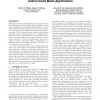Free Online Productivity Tools
i2Speak
i2Symbol
i2OCR
iTex2Img
iWeb2Print
iWeb2Shot
i2Type
iPdf2Split
iPdf2Merge
i2Bopomofo
i2Arabic
i2Style
i2Image
i2PDF
iLatex2Rtf
Sci2ools
111
click to vote
ICS
2005
Tsinghua U.
2005
Tsinghua U.
Improving the computational intensity of unstructured mesh applications
Although unstructured mesh algorithms are a popular means of solving problems across a broad range of disciplines—from texture mapping to computational fluid dynamics—they are often dominated not by computation, but by mesh overhead. Our study of an object-oriented mesh-based benchmark reveals that 72% of its execution time is spent on mesh-related operations, such as iterating over faces or chasing pointers. We report a series of optimizations—some traditional, some novel—that dramatically improve the benchmark’s computational intensity—the ratio of floating point operations to memory accesses. This improvement is attributable to an eight-fold reduction in memory operations and results in a 4.7× speedup in execution time. Our work demonstrates that common subexpression elimination and code motion are important optimizations for mesh-based codes. However, conservative analysis prevents their application. We discuss these barriers to analysis and argue that an understand...
Execution Time | ICS 2005 | Mesh-based Benchmark Reveals | Theoretical Computer Science | Unstructured Mesh Algorithms |
Related Content
| Added | 27 Jun 2010 |
| Updated | 27 Jun 2010 |
| Type | Conference |
| Year | 2005 |
| Where | ICS |
| Authors | Brian S. White, Sally A. McKee, Bronis R. de Supinski, Brian Miller, Daniel J. Quinlan, Martin Schulz |
Comments (0)

